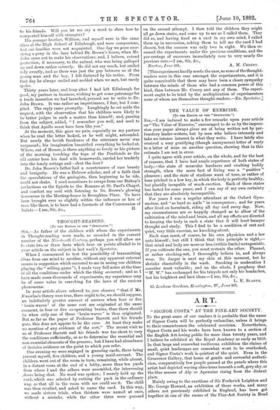THOUGHT-READING.
[To THE EDITOR OF THE "SPECTATOR."'
-Sr,—As father of the children with whom the experiments in Thought-reading were made, as recorded in the current number of the Nineteenth Century, perhaps you will allow me -to state two or three facts which bear on points alluded to in your article on the subject in last week's Spectator.
When I commenced to test the possibility of transmitting ideas from one mind to another, without any apparent external -means (a suggestion which occurred to me in seeing our children playing the" willing game "), I made very full notes at the time of all the conditions under which the thing occurred; and as I have made some thousands of experiments, my experience may be of some value in searching for the laws of the curious phenomena.
In your article above referred to, you observe "that if Mr. Nnowles's theory were true, there ought to be, we should suppose, an indefinitely greater amount of success when four or five 4 brain-waves' of the same sort are originated at the same moment, in four or five co-operating brains, than there should he when only one of those 'brain-waves' is thus originated. But so far as the paper of Professor Barrett and his friends goes, this does not appear to be the case. At least they make no mention of any evidence of the sort." The recent visit to us of Professor Barrett and his friends was too short to vary the conditions sufficiently, so as to determine the essential and -non-essential elements of the process; but I have had abundance -of decisive evidence on the point to which you refer.
One evening we were engaged in guessing cards, there being .present myself, five children, and a young maid-servant. The children went out of the room in turn, remaining, while absent, in a distant room at the end of a lobby, more than ten yards from where I and the others were assembled, the intervening .doors being shut. No word was spoken ; I merely held up the card, which was selected by cutting the pack in the ordinary way, so that all in the room with me could see it. The child was then recalled, and asked to name the card. In this way, we made sixteen trials, when thirteen were named at once, without a mistake, while the other three were guessed
on the second attempt. I then told the children they might all go down stairs, and come up to me as I called them. They did so, and having fixed on a card in my own mind, I called them up in succession, asking them to tell me the card I had chosen, but the success was only two in eight. We then re- sumed the experiments under the previous conditions, and the per-centage of successes immediately rose to very nearly the previous rate.—I am, Sir, &c., [This experiment hardly meets the case, as some of the thought- readers were in this case amongst the experimenters, and it is quite conceivable that there may have been a closes: sympathy between the minds of those who had a common power of this kind, than between Mr. Creery and any of them. The experi- ment ought to be tried by the multiplication of experimenters none of whom are themselves thought-readers.—En. Spectator.]




































 Previous page
Previous page